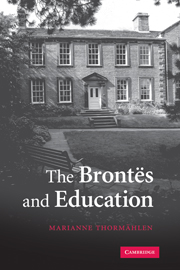Book contents
- Frontmatter
- Contents
- Acknowledgements
- Abbreviations and editions
- Introduction
- I EDUCATION AND SOCIETY
- II HOME AND SCHOOL
- III SUBJECTS AND SKILLS
- 7 A sound English education
- 8 Religion and education
- 9 The accomplishments
- 10 Male and female education
- 11 Beyond the schoolroom: reading and the Brontës
- IV STRATEGIES AND METHODS
- V ORIGINALITY AND FREEDOM
- Notes
- Select bibliography
- Index
11 - Beyond the schoolroom: reading and the Brontës
Published online by Cambridge University Press: 22 September 2009
- Frontmatter
- Contents
- Acknowledgements
- Abbreviations and editions
- Introduction
- I EDUCATION AND SOCIETY
- II HOME AND SCHOOL
- III SUBJECTS AND SKILLS
- 7 A sound English education
- 8 Religion and education
- 9 The accomplishments
- 10 Male and female education
- 11 Beyond the schoolroom: reading and the Brontës
- IV STRATEGIES AND METHODS
- V ORIGINALITY AND FREEDOM
- Notes
- Select bibliography
- Index
Summary
The quiet life of country gentlefolk is the situation in which the Brontë fiction leaves not only the Crimsworths but the Rochesters, the Moores at Fieldhead, the Markhams and the Earnshaws (the last three couples, it might be noted, on estates brought into the marriage by the female partner). Where there is no need to labour for gain, Brontë protagonists do not, preferring to cultivate their minds and relish the beauties of the countryside at leisure. Their best companions are their loved ones and books enjoyed in comfortable libraries.
It was a kind of existence known to many aspiring late-eighteenth- and early-nineteenth-century middle-class people through the works of that latter-day Horace, William Cowper, one of the most popular writers in the lifetime of the Brontës. He was a favourite with the whole family, as is clear not only from biographies from Mrs Gaskell onwards but also from the sisters' works. To them, Cowper was above all the poet of ‘The Castaway’; but though they were especially drawn to his renditions of human suffering, they were familiar with all of Cowper, including the eulogies to contented retirement in The Task.
The Brontë partiality to Cowper makes a convenient starting-point for a survey of their relationship with the world of books outside the set texts of the schoolroom. While something will be said about what, how and why the Brontës read, the full extent of their reading and its implications for their writing calls for a book of its own; as Michael Wheeler pointed out decades ago, ‘[s]tudents of the Brontës have long recognised that the sisters' reading provides as many clues to the source of their inspiration as do their biographies’.
- Type
- Chapter
- Information
- The Brontës and Education , pp. 136 - 150Publisher: Cambridge University PressPrint publication year: 2007



